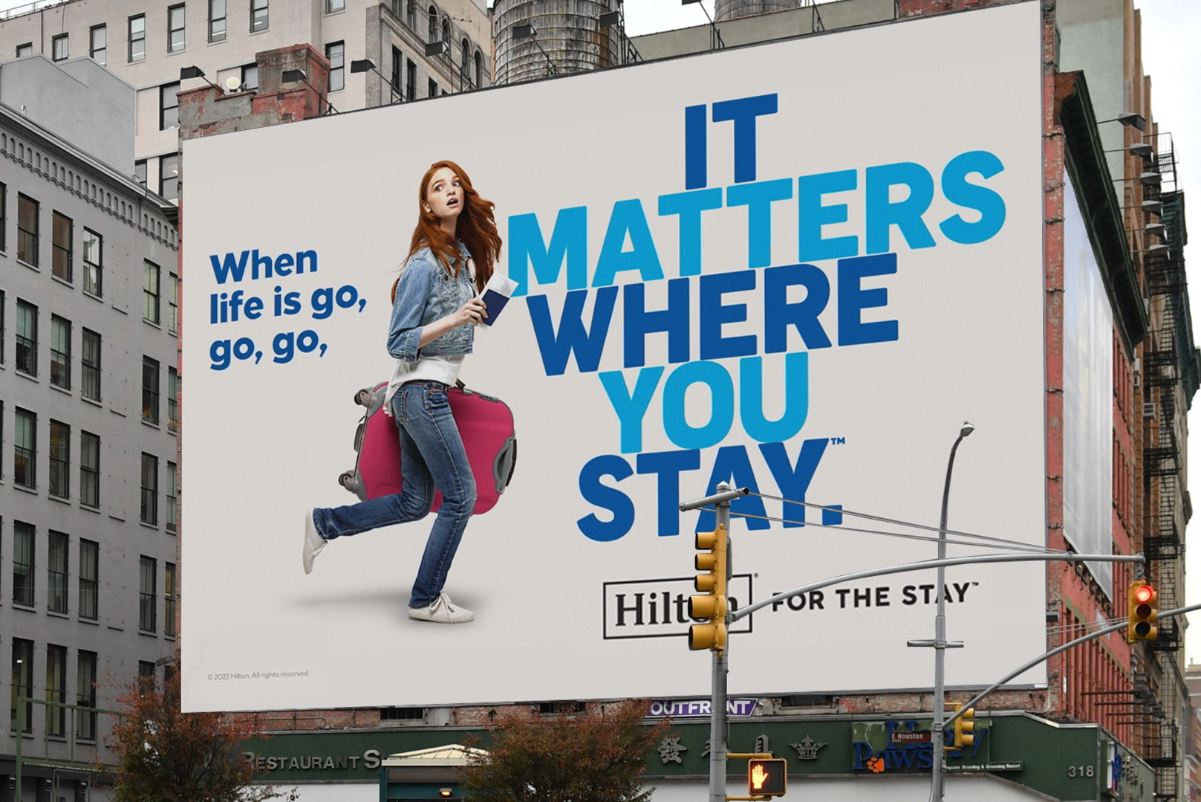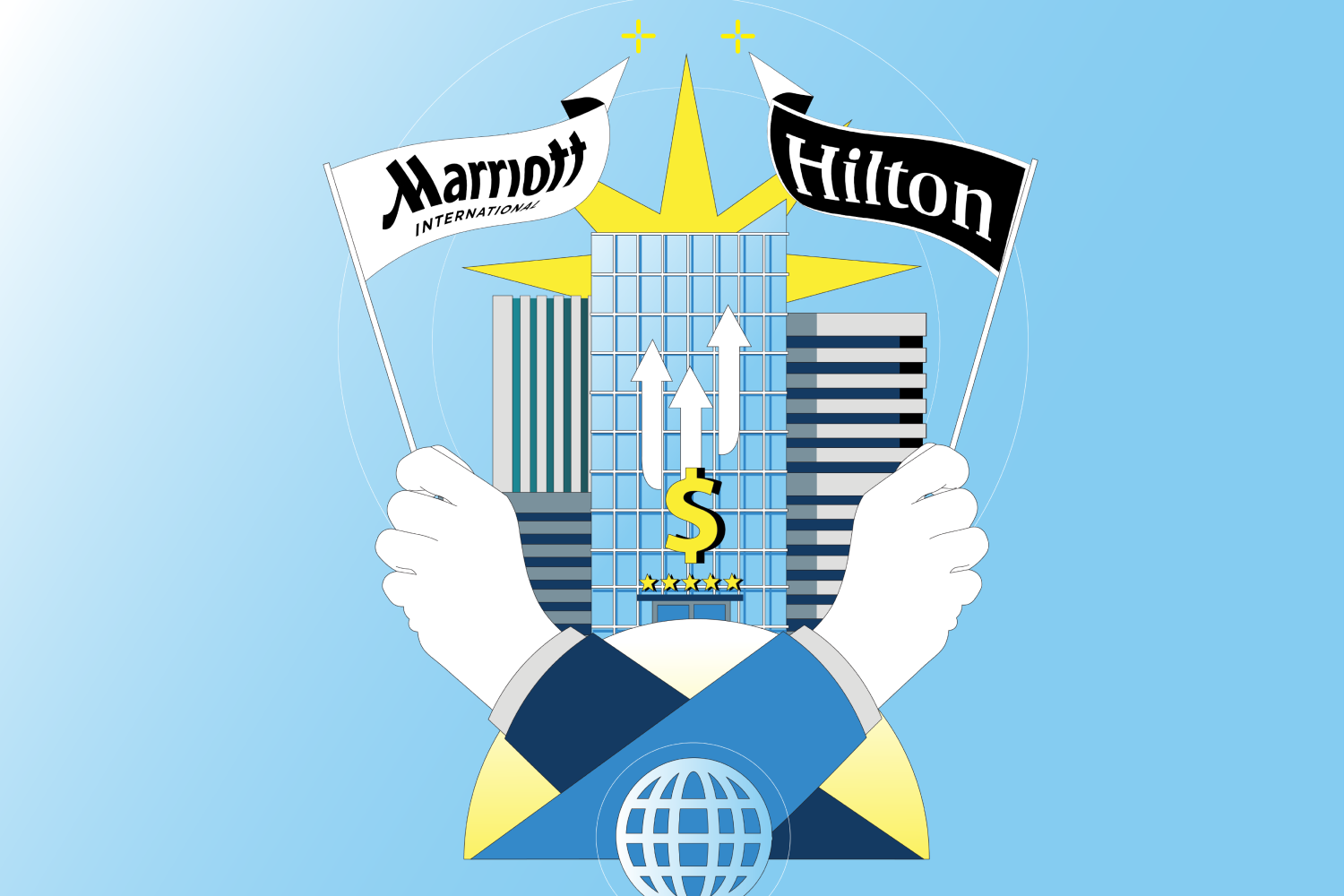Skift Take
Hilton undertook a partial rebrand last year. Early data suggests that the massive ad blitz, which contrasted hotels with alternative accommodations, is paying off.
Hilton Worldwide debuted a major international marketing effort a year ago – July 25, 2022 – that focused on reliable lodging experiences as its differentiator. It also debuted its first “platform” for the Hilton “masterbrand” — which essentially means it added the tagline “for the stay” to all of its Hilton messaging.
So how did it go?
The hotel giant said it saw sales, awareness, and market share gains from the effort, its largest marketing push in six years. It said the overall effort generated at least 16 billion “impressions” in the past year across TV ads, social media, paid online ads, billboards, and other channels.
It’s difficult to precisely know if the campaign helped Hilton’s reservations because we can’t compare a world without the ad blitz. But there are positive signs.
In the first quarter, Hilton said it saw a 17% year-over-year gain in consumers searching for “Hilton” online, for 11 million searches. The first quarter was a peak time for hotel booking season ahead of summer in the northern hemisphere.
Hilton also cited a survey that found that 59% of travelers considered Hilton for leisure travel in the first quarter — a 10.9 percentage point gain over the same period a year earlier.
The hotel giant said the brand marketing helped persuade customers who are actively booking hotel stays but are indecisive about making a final transaction. It said its so-called “lower funnel conversion” rose by 4 percentage points quarter-over-quarter in the first quarter. Hilton claimed it had data to show it was now ahead of Marriott in enjoying its brand halo as a tool for persuading indecisive travelers to book with its brand.
Previous campaigns featured images of destinations or swimming pools, essentially hiding their product in the background of scenic shots. Hilton’s ad blitz instead put rooms and lobbies front-and-center, aiming to highlight Hilton amenities, such as the ability for families to be able to have confirmed reservations for connected hotel rooms, to bring small pet dogs (that are accepted at about 5,000 of its roughly 9,000 properties), and to avoid the chance of surprises (such as housekeeping fees at many short-term rentals and vacation homes).
“We went all-in on building equity across all 19 of Hilton’s brands together, rather than dividing our dollars and impact,” said a company spokesperson. The portfolio approach maximized the company’s brand equity enough that it plans to “continue to do this.”
Ad agency network TBWA\Chiat\Day NY crafted the effort. AdAge honored the effort with a “creativity award for best rebrand” in April. TBWA was once Airbnb’s ad agency.
A Bet on a 10-Minute TikTok
Hilton also bet much more heavily on TikTok as a platform than it had in past ad blitzes. In the first 48 hours after launching a 10-minute-long video on TikTok, the video garnered 3.9 million views, more than a half-million “likes,” and more than 15,000 shares.
Since the video launched, the company’s Hilton TikTok account has received over 20,000 new followers, with most comments on the video being positive.
“We’re trying to be more culturally relevant and in the stream,” said Chris Silcock, chief commercial officer at Hilton, of the video.

Contrasting With Rentals
Hotel brands have generally avoided being snarky or confrontational. But Hilton displayed some sharper elbows at moments of the campaign by taking shots at the comparative unpredictability of short-term rentals and vacation rentals.
The campaign’s theme was “It Matters Where You Stay,” with an implicit dig that some alternative options may be less desirable.
Hilton was in a better position to pull this off plausibly because it doesn’t have any alternative accommodation products, unlike some of its competitors, such as Marriott and Accor.
Campaigns come and go. What will last, officials said, was the tag line “for the stay,” which will appear along with the Hilton logo on all messaging that represents the company’s full portfolio.
“Campaigns may get swapped out or refreshed, but ‘Hilton — For the Stay’ is kind of what you would tattoo on the building or put on the back of a business card,” said Mark Weinstein, chief marketing officer.
For video ads, Hilton includes a three-note tune meant to echo the “for the stay” motto. A visual element shows a door opening to reveal the company’s logo.
Hilton was pleased enough with the campaign that it went back to ad agency TBWA\Chiat\Day\NY to have it make a spinoff aimed at hiring. The “Every Job Makes the Stay” campaign, launched this spring, spotlights Hilton’s employees.
Hilton officials said that perhaps one of the biggest signs that the masterbrand platform rollout succeeded is that some of its competitors have been adopting similar advertising tactics.
“Since launch, we’ve seen the industry shift their focus less on inspiring travel through destinations and experiences, and more on inspiring travel through amazing stays,” a spokesperson said. “For years, hotels have been reinforcing that they’re anonymous, interchangeable places to rest your head. We flipped the narrative … not all stays are alike.”
Have a confidential tip for Skift? Get in touch
Tags: advertising, brand marketing, branding, brands, future of lodging, hilton, marketing, marketing strategy, rebrand, rebranding
Photo credit: A billboard in New York City showing Hilton's "It Matters Where You Stay" ad campaign. Source: Hilton.

